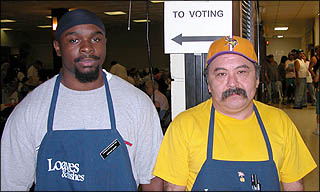 |  | Loaves & Fishes workers at poll. Photo: Sasha Aslanian |
Another unenforced law is the 1975 amendment to the Voting Rights Act, which requires that in counties where more than five percent of the people have limited English skills, bilingual voting materials must be made available.
As a result of the amendment, Spanish language ballots are the law in Upper Manhattan where Rosa Lazano lives.
Lazano is a 78 year-old women originally from the Dominican Republic. Though she has been a citizen for almost 20 years, Lazano doesn't speak much English.
Her daughter, Actagracia Santos acted as her translator when she was asked about problems she faced when trying to vote. Lazano says that the ballot was in English, that there were no Spanish instructions and that the poll workers did not speak Spanish.
New York City election officials say they are working to make sure materials are translated throughout the city, but insist it takes time. Across the country, many municipalities say it's a matter of resources. Some politicians wonder if it's worth it.
Roy Blunt is Republican majority whip in the U.S. House of Representatives and a former Secretary of State from Missouri. He says that given the number of languages that immigrants speak, it's a problem that is not so simple to solve.
"You know English really is the principal language of legal communication in America," says Blunt. "You can accommodate some major language groups, but the idea that you'd be accommodating all major language groups is not as easy as you would think."
Blunt also supports a new federal voting requirement that, some say, will add yet another obstacle to voting: a new law that would require people who register to vote by mail to show identification at the polls. Lloyd Leonard of the League of Women voters says this new requirement could discriminate against some voters.
"Its clear," says Leonard, "that upwards of 10 percent of lower income people don't have identification. Older people tend not to have drivers licenses, people of lower income tend to either not have a drivers license or other forms of identification. While middle class suburban people do in fact have identification, there are poor people who don't have that sort of identification."
At issue is an argument about how easy it should be to vote in America. On one side of the issue tend to be Republicans like Roy Blunt.
"I don' think there is anything wrong in a society where you have to have ID to do almost everything asks voters to show that shows that they are who they say they are," says Blunt.
Make voting too easy and we will end up with fraudulent elections -- with dogs and dead people voting Blunt warns.
"This is no longer an agrarian society where the purpose of the election judges themselves is to know everybody," continues Blunt, "so to ask people for the kind of ID they would have to have to get a library card is not an unreasonable thing."
On the other side of the argument are Democrats like Congressman John Lewis.
"Voting should be as simple as getting a glass of water," says Lewis, "but we make it so hard, so difficult, so inconvenient. A lot of the states, especially in the South--you got to get registered, you've got to show ID, you've got to give your mother's maiden name..."
Lewis thinks it should be easier, and describes what he would like to see, "Maybe, just maybe, if you're born in this country or you come to this country or (when) you become 18, you are automatic registered."
Back to Whose Vote Counts?
| 
